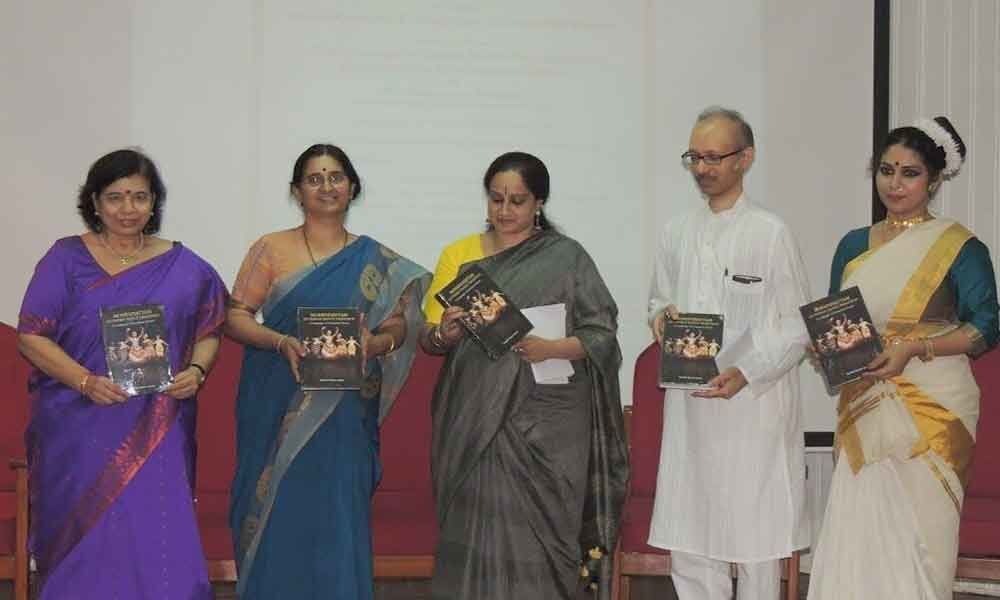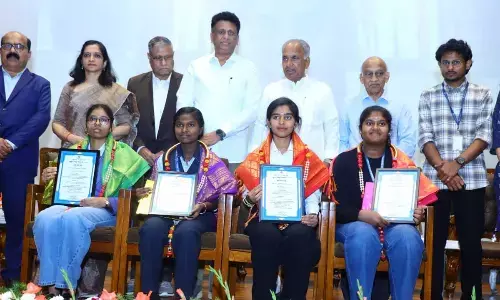Language of feminine desire

Mythili Maratt Anoop’s book, "Mohiniyattam, An Indian Dance Tradition: A Language of Feminine Desire" published by Shubhi was launched by Dr Rekha Pande, Dr Anuradha Jonnalagadda and Dr Anupama Kailash
The Centre for Women's Studies headed by Prof Rekha Pande organised a performance, talk and book release at CV Raman Auditorium at the University ofHyderabad. Dr Anuradha Jonnalagadda gave the introductory remarks.
The talk was delivered by reputed Kuchipudi, Vilasini Natyam exponent and scholar, Dr Anupama Kailash on the concept of lasya in textual and performance traditions.
During the event, Dr Anupama presented brilliant insights and revelations onthe concept oflasya, linking it to the idea of shakthi, or energy, and lustre.The notions of lasya andtandava, which are popularly associated with women and men's dancing are in factgrammars without any gender affixed to them.
While tandava is relatedto the idea ofinert matter, lasya is linked to movement and energy that brings life to matter. With suitable examples shedemonstrated the richness of the indigenous knowledge systems thatarose from theland, which have been rejected by modern knowledge.
Mythili Maratt Anoop's book, "Mohiniyattam, An IndianDance Tradition: A Language of Feminine Desire" published by Shubhi was released at the program by DrRekha Pande, Dr Anuradha Jonnalagadda and Dr Anupama Kailash.
Mythili spoke briefly about the key ideas that she pursued in her research at IITMumbai. Drawing on the fact that all human beings have a primary needfor creating symbols that do not fulfill any of the basic survival needs associated with animals,and that fall in the domain of ritual, magic and art, she approacheddance as a formof symbolic behaviour.
The form of Mohiniyattam can be understood asthe dance of Mohini, or one who engenders Moha or desire in the minds of theonlookers. But thisdesire is not merely one that entices and allures. Mythili referred to the mythical formof the Mohini, who is in fact Vishnu's female form, to show that theconcept shows a deeper desire to identify with the feminine.
She also discussed the relevance of Sudhir Kakkar's idea of the maternal feminine as very significant inthe formation ofthe Indian psyche, and the notion itself is rooted in our mythology.Mohiniyattamstages a culture's idealization of the notion of femininity.
Mythili performed three compositions that showeddifferent moods of the nayika. "Panimathi mukhi bale" A lilting Swathi Thirunal Padam in Ahiriraagam, one of the first tobe choreographed at Kerala kalamandalam - shows vipralamba sringara. - The ideaof the feminine as the one who is desire and eternallywaiting for her lord.The yearning mood was beautifully brought out bythe artiste.
"Mogudochi Pilichedu", was a Padam by Sarangapani in Sahana raagam,in which thenayika who was married as a child to another, yearns for Krishna, whois her onlytrue love.
Having grown up, her husband comes to take her away and she meetsKrishna and pleads with him to not forget her love. This is an instanceof the idea oftransgression of societal norms - the space for play and alternate subjectivities. Expressive abhinaya showed the transcendence ofdevotion to the divine.
Some lines from Amir Khusrau followed even in Sufism; the spiritualseeker is cast asfeminine who longs for union with the lord, the lover. The popularlines 'PiyaGhar aaye' and 'chaap tilak sab cheen li" were sung in a style suitable for Mohiniyattam by Sudev Warrier, a disciple of Balamurali Krishna and was well-received by the audience.
The melodious lines were exquisitely enactedbringing the program to a close.
- Features Desk









